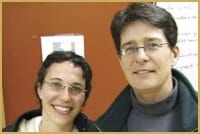The Centre held the first of two community meetings to gather input on the feasibility of building a much-needed new community centre for Vancouver’s queer community, Nov 2. But only six people showed up at Gordon Neighbourhood House to share their input and show their support for the plan.
“We are baffled. We are absolutely baffled,” says Betty Baxter, who is under contract by The Centre to facilitate the information-gathering portion of the feasibility study. “There are lots of creative ideas. I’m just at bit disappointed by the community.”
The Centre has been flirting with the idea of a dedicated queer community centre building since at least 1973. Its current digs at the corner of Bute and Davie Sts are dilapidated, unsuitable, and accessible only via a steep and narrow staircase.
The current feasibility study saga began in March of 2005 when Vancouver City Council set aside as much as $100,000 to spur the project forward. But while the civic election loomed, the city waited for The Centre to submit a proposal for how the money would be spent; the proposal never came.
On Apr 7, after the NPA won control in the election and members of the queer community turned out in force to convince council to support the idea, the city awarded a $35,000 grant for a study into the feasibility of a new building. The Centre contributed $10,000 to the project; all the money it had in its building fund.
Virtually nothing happened publicly between April and Sep 21, when The Centre announced that a series of focus groups and town hall meetings were set to commence just three weeks later, on Oct 12.
“For at least a couple of decades people have been talking about building a community centre that’s more accessible,” said Baxter at the Nov 2 meeting. “Each time, it seems like there are false starts and lost opportunities,” she continued. “We don’t quite know what we want and we don’t get a capital campaign off the ground.
“The Centre applied for the $1-millionVancity Award two years ago,” she explained. “We were very, very close, but when the questions were asked: ‘Can you document support for this in the community and do know what your community can sustain?’ they were not answered in any way that would convince a funder that money would be well spent.”
Baxter says she’s encouraged by the number of people who have completed an online survey (286 so far), but that participation in the focus groups has been disappointing, too.
She says of the 10 men who signed up for the gay men’s group, only four showed up. The most disappointing turnout was for the queer business group at which only two participants showed up.
“I expected to see the walls falling out at the town hall meeting because of the number of people attending,” said Erik Graff, one of the six at the tiny gathering. “Do we deserve a community centre when there’s so little support? I thought there’d be at least 60 or 70 people.
“Here we have a rainy night,” he continued. “It’s good for nothing else. Why not come out and find out what it’s all about? It’s been widely talked about in the last few years that $1 million is up for grabs. If we don’t even show an interest ourselves, how can we expect the providers of that kind of money to give it to us?”
But Rebecca Shields, a member of The Centre’s board of directors, remains optimistic.
“I believe the capacity is there,” she says. “It’s about engaging our donors. If we engage people, I think we can support it as a community. Maybe we need a place that has yoga or a coffee shop. Maybe right now people see The Centre as something that doesn’t have any services for them.”
Still, neither Shields nor The Centre’s executive director, Donna Wilson, have attended any of the focus groups themselves.
“The board of directors are staying away,” says Shields. “It’s really important to appear like we’re not driving the process, so I haven’t gone and none of the board members have been to any of the focus groups. We want to appear impartial and wait for [Baxter] to submit her results.”
But unless those who hope to govern The Centre into the future take an active leadership role raising the money and support needed to make the new building a reality, it remains unclear how it will ever come to fruition.
“What is our community going to look like 15 or 20 years from now?” wondered Little Sister’s co-owner Jim Deva. “As we move out into the suburbs, are we going to have a core that holds us all together? If we don’t work right now to actively create a major centre in our city, we’re going to have a wasteland in 20 years. We’re going to have people searching for community and there will be no central place for our community to be. It’s going to be extremely dangerous.”
There is one more town hall meeting and more focus groups scheduled to run through Nov 23.

 Why you can trust Xtra
Why you can trust Xtra


